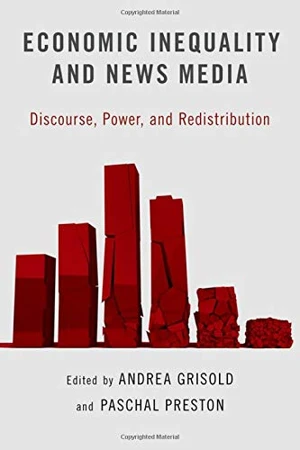✕
Economic Inequality and News Media – Discourse, Power, and Redistribution

Grado:
adelantado
Blurb
"Despite the rediscovery of the inequality topic by economists as well as other social scientists in recent times, relatively little is known about how economic inequality is mediated to the wider public of ordinary citizens and workers. That is precisely where this book steps in: It draws on a cross-national empirical study to examine how mainstream news media discuss, respond to, and engage with such important and politically sensitive issues and trends. Clearly, economic inequalities have become increasingly prominent issues in recent public debates, not least in the context of the latest Great Recession that followed from the financial crash in 2007, and attendant austerity regimes in many countries. This holds true for the debate in the wider public sphere as well as in many fields of academic study, not least in the two specific disciplinary areas most related to this book: political economy and media and journalism studies. Yet, in precisely those two academic fields we find important and parallel 'blindspots' which underline the distinctive focus and contribution of the present book: On the one hand, key issues related to economic inequalities (much like economic processes in general), have been much neglected in the academic fields specialising in news media and journalism studies. On the other hand, the major schools of theory and analysis in mainstream economics have paid relatively little explicit attention to the evolving scope, role or implications of mediated communication. This blindspot applies to both the conduct and performance of economic processes in general, as well as to engagement with the highly sensitive sub-arena of economic inequalities which is of particular interest in this book. In essence, this book is informed by the findings of a distinctive multi-country empirical research project undertaken by a multi-disciplinary team of researchers with economic, media and linguistic expertise. It explores how Piketty's book has been received and represented by news media based across four countries (Austria, Germany, Ireland and the United Kingdom) in the thirteen months following its publication. The primary aim of this book is to present the findings of a transdisciplinary and cross-national empirical study of news media coverage of economic inequality themes in four European countries. It focuses on the period following the launch of Thomas Piketty's (2014) high-profile and best-selling book 'Capital in the Twenty-First Century' (C21). This study is informed by a distinctive theoretical perspective drawing from institutional and political economy, media and journalism studies fields as well as critical discourse analysis. It is mindful of longer-term trends of rising economic inequality as well as the rather extraordinary series of electoral processes and redistribution policy outcomes across many electoral systems over recent decades. In sum, this book offers novel insights on key features of much-neglected links between how news media select, frame and discuss issues related to economic inequality and how such story-telling links to the specific aspects of the economic and public policy factors shaping the onward march of economic inequality in the long-run"--Comment from our editors:
This book gives an excellent approach into inequality in economics and news media. It critically examines the topics of political economy and journalism/media.
This material has been suggested and edited by:
Necesitamos cookies. Pincha en “Aceptar” para ayudarnos a hacer de Exploring Economics una mejor plataforma.

